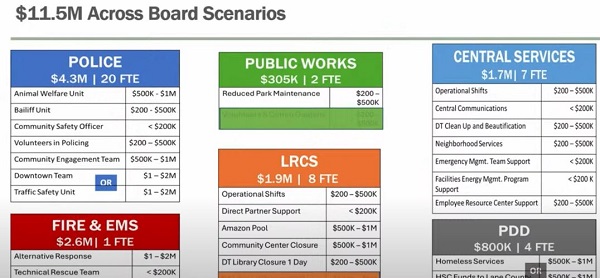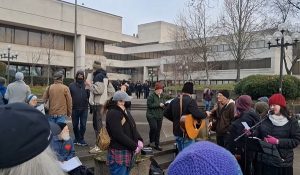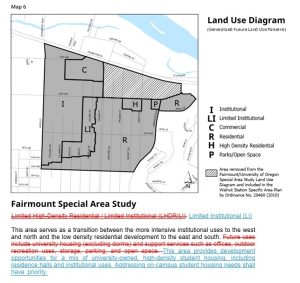Council rejects vote of the people, approves $10 million fee
7 min read
Presenter: The City Council heard what might happen if a new $10 million fee is not approved. On Feb. 10, Councilor Alan Zelenka:
Councilor Alan Zelenka: Why you should support this should be abundantly clear from this list of service cuts. Let me read them:
Animal welfare program gone; police officers gone; crime prevention team gone; community safety officers; Volunteers In Policing and CAHOOTS; rescue team from the Fire Department; the hazmat Fire Department team; closing fire station; cuts to Kidsports; Boys and Girls Club; Amazon Pool; closing Sheldon and the community centers; closing the library one to two days; reducing park maintenance; homelessness services gone; human services funding significantly reduced; economic development out the window; downtown cleanup; neighborhood services all gone.
[00:00:49] (If) that list doesn’t make you pay attention and say, ‘Oh, that’s not good,’ and this is a modest, very thoughtful way of addressing that with this fire fee…. so I encourage us moving forward with the fire fee.
[00:01:03] Presenter: Councilor Lyndsie Leech:
[00:01:05] Councilor Lyndsie Leech: I refuse today to vote to lay off 50 people at least. I refuse to reduce the safety and security of our community when that is the number one priority that our community has asked us to provide. I refuse to decrease the resiliency of our families in our community with preschool cuts, with reduction in affordable activities, and closure of our library.
[00:01:33] I refuse to impede our ability to respond to emergencies—our fires, mental health crises, natural disasters, and other things that are going to be coming into our community. And I refuse to stunt our ability to go seek additional funding through our intergovernmental relations team who right now as we speak is up in Salem advocating for millions of dollars of funding for our city…
[00:01:57] Let’s be very, very clear right now that all of these cuts will impact our low-income people way, way more than an average of $10 a month.
[00:02:09] Presenter: Councilor Jennifer Yeh:
[00:02:11] Councilor Jennifer Yeh: When I look at this list of things (and many people have already said this), I cannot imagine the Eugene with these things gone. It is heartbreaking to think and no one in this community will be safer when these things are gone…
[00:02:27] Our Fire / EMS is very similar to a utility. It’s something we count on to be there every day. It cannot stop working. We do not have the luxury of people not being ready to go all day long, every day of the year and very similar to, like, our water, our wastewater, our electricity, right?
[00:02:45] So creating a process that has protected adjustable funding seems very appropriate to me for this specific department in our city. And while… this is not going to fix our Fire and EMS Department’s problems, it does get us moving in the right direction.
[00:03:03] Presenter: Councilor Eliza Kashinsky:
[00:03:05] Councilor Eliza Kashinsky: So what I spent this weekend doing was meeting with constituents in my ward, one of whom had been viciously attacked by a dog. She was attacked on a Saturday, but she was not able to talk to animal welfare for days after being viciously attacked because two years ago we cut an animal welfare officer and they no longer work on the weekends.
[00:03:26] And so when we look at this list—and I use that as an example because it’s the first one on the list—and I feel like for each one of these items on here, we could have similar stories where we have residents and constituents saying, we need more of this service…
[00:03:42] The fee that we’re talking about, for most people, it’s going to cost less than a Netflix subscription.
[00:03:48] Presenter: Councilor Matt Keating:
[00:03:50] Councilor Matt Keating: For a whole host of reasons—animal services, library, fire, public safety—this is a hold my nose and stand in the affirmative that I find it a necessity and to do the antithesis and to bring it down to the studs certainly is not a community that I—and I suppose and imagine the vast majority of this city—would not want to see.
[00:04:17] Presenter: Councilor Randy Groves:
[00:04:19] Councilor Randy Groves: It’s gut-wrenching to see what we are looking at in the way of reductions for our community. But at the same time, I’ve heard from quite a few people that are planning on an initiative petition process, and I believe we have a better chance of managing that ourselves by referring it to the voters and then going out and explaining the ‘why.’
[00:04:42] Right now, people still do not understand the ‘why.’ And that’s how we make our decisions as human beings, is starting with the ‘why’ and then you work into the ‘what,’ the ‘how,’ and the ‘when.’
[00:04:53] And so, I don’t think we’ve done an adequate job of explaining the situation broadly enough to where the members of the public are hearing it. And I actually think they will appreciate it if we are able to spend a little more time communicating.
[00:05:09] Presenter: Councilor Mike Clark asked the council to let the voters decide.
[00:05:13] Councilor Mike Clark: I believe it is a virtual certainty that the 5,800 petition signatures required to send this to a public vote would be gathered. And if anybody doubts that, you’ve received an email tonight that lists all the folks who are involved in the process of getting such a referral put together and collecting those signatures.
[00:05:37] The people will vote on this, that’s my opinion. I believe that either we’ll agree to refer it to them to vote, where we’re in control and as Randy so eloquently said, we’ll have an opportunity to make a case for why this is the best way to go short-term, or they’ll sign enough petitions to vote on it in August.
[00:06:00] But the cost of that bet, if you’re going to bet that they’re not going to collect that number of petitions, is that we’ll have to make a decision by June on the next year biennial budget and people will have to be laid off because we won’t be able to institute the fee by then. The manager won’t have any ability to solve the short-term that way, and those firings will have to take place.
[00:06:28] If we’re in control of the ‘ask people what they think,’ we can make the case, bring them along, and say, ‘Hey, this is why this is the best option.’ And so, this is an option for us to win and it avoids the option where we’re forced into a really ugly decision-making process.
[00:06:47] It’s patently obvious to me that the public will vote on this, whether we like it or not. And so there is a much safer outcome for these programs if we vote in favor of this amendment [to add a new Section 6 that states, ‘This ordinance shall take effect only if approved by the voters at the May 2025 election’] rather than have it thrust upon us. Because then the manager has no choice but has to make the cuts because the election will be later.
[00:07:28] Presenter: Noting other increases across the community, and a future election to renew the Community Safety Initiative, Councilor Greg Evans:
[00:07:37] Councilor Greg Evans: Our taxpayers are going to be facing rates being raised with EWEB. We’re going to come back and ask them in two years to renew a CSI (Community Safety Initiative) put in place to bolster up our public safety investments.
[00:07:53] And you know, I have people constantly coming to me in my ward and in other wards on the West Side saying, ‘Where’s our cops at?’… We’re getting hit hard with property crime, personal kind of crimes, and we are not gaining traction in reducing a lot of those things that are happening. A lot of stuff that is going just unreported because people have realized that we don’t have the capacity to meet their needs in these areas.
[00:08:28] So when you talk about your utility bills going to be going up, a CSI, and then in the background’s lurking the county with a public safety fee increase, and also other increases that may come down the pike.
[00:08:48] We have to be very conscious about all of those impacts on our taxpayers and residents. Because it’s not just, you know, $10 a month per household on average. It will be $10 a month plus EWEB, plus CSI, plus the gas bill.
[00:09:12] And I for one find it very hard, even in my own household, to say, you know, to the people who live with me and my neighbors and everybody else, ‘Oh, well, increase this and that and the other thing because it’s critical for service delivery.’ And they know it, they understand it, but they’re telling me, ‘Right now, with inflation the way it is, we are not in a position to take it.’
[00:09:43] And what we really need, and what I suggested to the mayor and the council vice president earlier today was a longer, more in-depth conversation about how we stabilize our budget over the long haul, maybe 10 to 15 years, and look at prioritization of the services that we can and should deliver, and we’re supposed to deliver by charter, and those that maybe we can deliver in a different way, if we work with some of our partners like Lane County and Springfield to deliver the same services in a more comprehensive and collaborative way…
[00:10:30] Because human rights goes across the board. It’s all over the county. It’s not just the city of Eugene. People have human rights issues in Springfield, in Junction City, in Cottage Grove. We have other things in terms of parks where we may be able to do some creative things. We already have River Road Parks District that is suffering from a revenue drain because as people annex into the city, they go out of River Road Parks District and come into the city’s park district…
[00:11:07] Presenter: In identical 5-3 votes Monday evening, Eugene city councilors reject a proposal to refer to the voters a $10 million fee, then approve it themselves.
[00:11:18] With residents reportedly organizing to collect signatures, the fee will likely go to a vote of the people anyway, leaving city staff facing an uncertain future.




